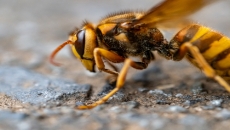A report by advocates for Canadian inmates is criticizing the rising rates of incarceration in at least two provincial jail systems amid the continuing pandemic.
About a year after the first COVID-19 cases emerged in Ontario jails, the update by the Prison Pandemic Partnership says the risk to inmates increases when there is less space.
The partnership — which includes the Centre for Access to Information and Justice, the Criminalization and Punishment Education Project and the Canadian Civil Liberties Association — estimates that more than 7,000 cases of COVID-19 have been linked to Canadian jails and prisons, including over 5,000 infections among prisoners.
It says at the outset of the pandemic, from March through June last year, prison populations across the country fell in an effort to increase the space available and enable physical distancing.
However, the study used Statistics Canada data to show that most provincial and territorial jail systems started to put more people back in jail over the summer.
By September last year, incarceration rates had gone back up — though still remaining below pre-pandemic levels — in Newfoundland and Labrador, Prince Edward Island, Nova Scotia, New Brunswick, Quebec, Ontario, Manitoba, Saskatchewan, Alberta, Nunavut, Northwest Territories and Yukon.
Only the federal prison systems and British Columbia's system continued a trend over the summer of decreasing their populations.
The federal prison population, which was at about 13,891 last February, fell five per cent to 13,141 by June, after the first wave of COVID-19, and as of January this year it was down 10 per cent to 12,500 prisoners.
However, in Ontario, where the jail population initially dropped to 5,811 from 8,269 last June, the figures have been going up. As of Monday, the number of people in custody had reached 7,131.
In Nova Scotia, there were about 440 people in custody pre-pandemic, which fell to 268 by June last year, but the figure had rebounded to 353 as of Monday.
In contrast, Quebec, Prince Edward Island and Saskatchewan have continued downward trends in jail populations since September, the report notes.
The partnership didn't have recent data on inmate counts for Alberta, Manitoba, New Brunswick, Nunavut, Northwest Territories, Yukon and Newfoundland and Labrador.
"The rising incarceration rates in some jurisdictions, particularly in Ontario where a number of provincial jails and prisons have experienced large outbreaks since December 2020, is deeply concerning," the report says.
"Crowded congregate settings are susceptible to large outbreaks of COVID-19."
The report notes that in most jurisdictions, vaccination campaigns targeting prison settings have yet to begin.
The partnership says it is calling upon federal, provincial and territorial governments to "act now by ramping up efforts to divert and decarcerate people from custody accompanied by supports in the community, such as housing."
Andrew Morrison, a spokesman for the Ministry of the Solicitor General in Ontario, said the issuing of more temporary absences to people who serve custody on weekends is "allowing (inmates) to serve their time in the community."
He noted the ministry is working with police, courts and others in the justice system to reduce the numbers coming into custody but added the department must still "ensure community safety remains paramount."
In Nova Scotia, Justice Department spokeswoman Heather Fairbairn said there are no active cases of COVID-19 in the province's jails, and there have been only two cases to date.
"We continue to manage admissions and releases as we have since March 2020, with eligible inmates considered for temporary absence and early release," she wrote in an email on Monday.






